|
|
The venerables Isaac (Isaacius), Dalmatus (Dalmatius) and Faust (Faustus)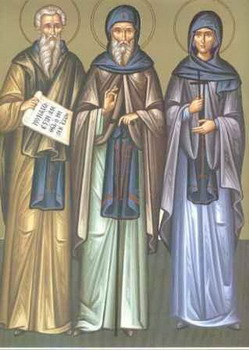 Venerable Isaac is celebrated again separately on May 30. At first, St. Dalmatus was an officer during the reign of Emperor Theodosius the Great whom the emperor held in great esteem. When the spirit awakened in him, he despised all earthly things, resigned his rank and took his only son Faust and, with him, went to the community of St. Isaac in the outskirts of Constantinople where they both were tonsured as monks. Dalmatus was completely devoted to a god-pleasing life for which the elder Isaac rejoiced. When Isaac approached the hour of death, he appointed Dalmatus as abbot in his place. Later, this community was named after him - the so-called Dalmatus. Dalmatus devoted himself to fasting, at times for forty days. By fasting he conquered the invisible demonic power. He participated in the Third Ecumenical Council [Ephesus 431 A.D.] and fought against the Nestorian heresy. Pleasing God, he died peacefully in the fifth century. His son Faust supported his father in everything and, after a God-pleasing life, died peacefully in this Dalmatus community. Venerable Isaac is celebrated again separately on May 30. At first, St. Dalmatus was an officer during the reign of Emperor Theodosius the Great whom the emperor held in great esteem. When the spirit awakened in him, he despised all earthly things, resigned his rank and took his only son Faust and, with him, went to the community of St. Isaac in the outskirts of Constantinople where they both were tonsured as monks. Dalmatus was completely devoted to a god-pleasing life for which the elder Isaac rejoiced. When Isaac approached the hour of death, he appointed Dalmatus as abbot in his place. Later, this community was named after him - the so-called Dalmatus. Dalmatus devoted himself to fasting, at times for forty days. By fasting he conquered the invisible demonic power. He participated in the Third Ecumenical Council [Ephesus 431 A.D.] and fought against the Nestorian heresy. Pleasing God, he died peacefully in the fifth century. His son Faust supported his father in everything and, after a God-pleasing life, died peacefully in this Dalmatus community. Venerable Cosmas, The eunuchCosmas was a monk from the Pharan Lavra. He was well versed in Holy Scripture. So much did he value the words of St. Athanasius the Great that he said to his disciples: "Whenever you hear any word from the books of St. Athanasius and, if you have no paper, write it down on your handkerchief." In his old age, Cosmas came to Antioch to Patriarch Gregory (+584 A.D.) and there ended his life. The patriarch ordered that the body of Cosmas be buried in the monastery of the partiarchate. A man frequently came to the grave of Cosmas, honoring the saint and prayed to God there. Asked why he did this, he revealed that he lay paralyzed for twelve years and that St. Cosmas had healed him.
Venerable Anthony, The Roman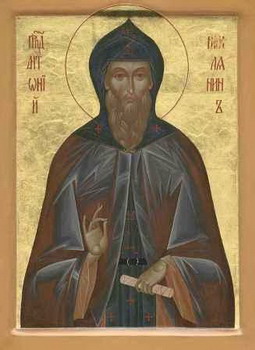 Anthony was born in Rome in 1086 A.D. of devout and wealthy parents. At that time, the Roman Church separated from the Eastern Church and all who remained faithful to the Eastern Church were persecuted by the Roman clergy. Among the persecuted was Anthony. He distributed all of his inherited wealth and was tonsured a monk. Anthony lived a life of mortification by standing on a rock in the sea for fourteen months. Meanwhile, the rock separated from its base and by miraculous providence sailed the waters to Novgorod. In Novgorod, Archbishop Nicetas received him kindly and helped him build a church to the Holy Birth-giver of God, later to become a monastery. Anthony lived a long time as the abbot of this monastery and manifested the great power of grace through many miracles. He died peacefully in the year 1146 A.D. and took up habitation in the mansions of the Lord. Anthony was born in Rome in 1086 A.D. of devout and wealthy parents. At that time, the Roman Church separated from the Eastern Church and all who remained faithful to the Eastern Church were persecuted by the Roman clergy. Among the persecuted was Anthony. He distributed all of his inherited wealth and was tonsured a monk. Anthony lived a life of mortification by standing on a rock in the sea for fourteen months. Meanwhile, the rock separated from its base and by miraculous providence sailed the waters to Novgorod. In Novgorod, Archbishop Nicetas received him kindly and helped him build a church to the Holy Birth-giver of God, later to become a monastery. Anthony lived a long time as the abbot of this monastery and manifested the great power of grace through many miracles. He died peacefully in the year 1146 A.D. and took up habitation in the mansions of the Lord. Saint Salome, The Myrrh-bearer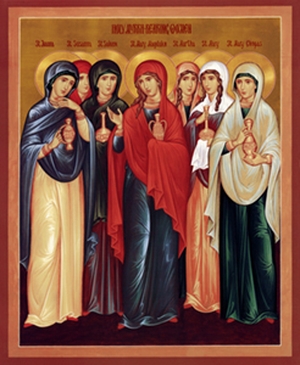 Salome was the mother of the Apostles James and John, the wife of Zebedee and the daughter of Joseph, the betrothed of the All-Holy Birth-giver of God. She served the Lord during His earthly life and was deemed worthy to be among the first to proclaim His resurrection. Salome was the mother of the Apostles James and John, the wife of Zebedee and the daughter of Joseph, the betrothed of the All-Holy Birth-giver of God. She served the Lord during His earthly life and was deemed worthy to be among the first to proclaim His resurrection.Protomartyr Rajden of Tsromi and Nikozi, Georgia (457)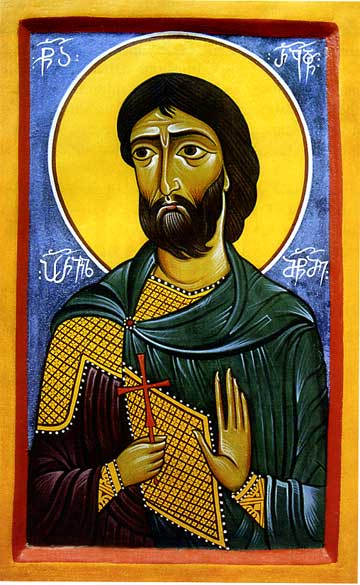 The Martyr Razhdenes, a Persian and worshipper of the Zoroastrian religion, was descended from an illustrious family. He was the tutor of the Persian princess Balendykhta (daughter of the Persian emperor Ormizd), who entered into marriage with the pious Gruzian [Georgian] emperor Vakhtang the Great (446-449). Together with her, Razhdenes resettled in Gruzia... The Martyr Razhdenes, a Persian and worshipper of the Zoroastrian religion, was descended from an illustrious family. He was the tutor of the Persian princess Balendykhta (daughter of the Persian emperor Ormizd), who entered into marriage with the pious Gruzian [Georgian] emperor Vakhtang the Great (446-449). Together with her, Razhdenes resettled in Gruzia...Venerable Theoctistus the Wonderworker of OptimatonVenerable John, confessor, abbot of Patalaria Monastery
Nine Kherkheulidze brothers, their mother and sister, and 9,000 others, who suffered on the field of Marabde, Georgia (1625)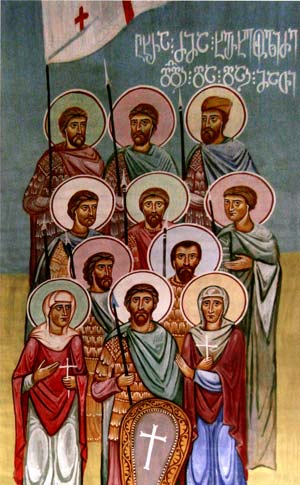 On the Feast of the Annunciation in the year 1625, the Georgians annihilated the army of the Persian shah Abbas I in the Battle of Martqopi. The victory unified Georgia’s eastern provinces of Kartli and Kakheti. It also instilled hope in other enslaved peoples of the Transcaucasus, and rebellions began to break out everywhere... On the Feast of the Annunciation in the year 1625, the Georgians annihilated the army of the Persian shah Abbas I in the Battle of Martqopi. The victory unified Georgia’s eastern provinces of Kartli and Kakheti. It also instilled hope in other enslaved peoples of the Transcaucasus, and rebellions began to break out everywhere... |